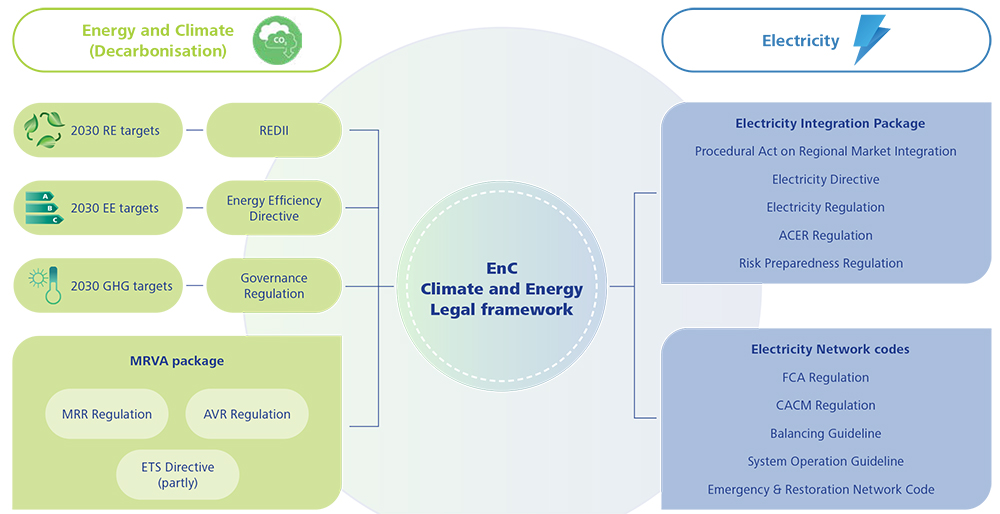The European Union’s CBAM Regulation entered into application on 1 October 2023 with the aim to tackle carbon leakage and to gradually move towards putting a price on the carbon, emitted during the production of carbon intensive goods that enter the EU. Since then, the importers of aluminium, cement, electricity, fertilisers, hydrogen as well as iron and steel into the EU are obliged to submit quarterly reports to the European Commission on the embedded GHG emissions of their imported goods.
Electricity market coupling – a flagship project of the Energy Community – is strongly intertwined with CBAM, as the Regulation outlines the possibility of a time-limited exemption for electricity, imported from non-EU countries whose electricity markets are coupled with that of the EU Member States. The concept of the exemption is based on the premise that there are currently no technical solutions to apply CBAM on electricity markets of third countries that are coupled with the EU. This however also means that from 1 January 2026, Contracting Parties can remain or become coupled with the EU electricity market only if they receive an exemption from CBAM.
It is the priority of the Energy Community Secretariat that the achievements of energy market integration are preserved, and the accelerated integration of Contracting Parties into the EU is maintained in the energy and climate action areas. The Secretariat continues to monitor the policies and measures in Contracting Parties that could support securing an exemption from CBAM in electricity.
The latest edition of the Energy Community CBAM Readiness Tracker gives an overview of Contracting Parties’ achievements related to fulfilling the CBAM exemption criteria. The transposition of the Electricity Integration Package and the completion of market coupling remain the most immediate and urgent task to be finalized. In parallel, the commitment and the planning towards 2050 climate neutrality and the establishment of a cap-and-trade system for electricity from 2030 must be carved out by Contracting Parties as soon as possible.
Contracting Party compliance with CBAM electricity exemption criteria
Article 2.7 - Market coupling completed
| Contracting Parties |
Albania | Bosnia and Herzegovina |
Georgia | Kosovo* | Moldova | Montenegro | North Macedonia |
Serbia | Ukraine |
|---|---|---|---|---|---|---|---|---|---|
| Condition status |  |
 |
 |
 |
 |
 |
 |
 |
 |
 |
Condition not completed |  |
Work ongoing / progress visible |  |
Condition completed |
status: October 2024
Article 2.7 (a) - Concluded agreement with the Union with the obligation to apply Union law in energy, electricity including renewable energy, environment and competition
| Contracting Parties |
Albania | Bosnia and Herzegovina |
Georgia | Kosovo* | Moldova | Montenegro | North Macedonia |
Serbia | Ukraine |
|---|---|---|---|---|---|---|---|---|---|
| Condition status |  |
 |
 |
 |
 |
 |
 |
 |
 |
 |
Condition not completed |  |
Work ongoing / progress visible |  |
Condition completed |
status: October 2024
Article 2.7 (b) – Domestic legislation implements the main provisions of electricity market regulation and renewable energy and market coupling of electricity markets
| Contracting Parties / Status |
Albania | Bosnia and Herzegovina |
Georgia | Kosovo* | Moldova | Montenegro | North Macedonia |
Serbia | Ukraine |
|---|---|---|---|---|---|---|---|---|---|
| Condition status | The fulfillment of the condition of electricity market coupling is pending transposition and implementation of the Electricity Integration Package as due on 31.12.2023, but remains incomplete in all nine Contracting Parties. | ||||||||
| Renewable energy implementation (%)* | 61% | 48% | 45% | 70% | 62% | 50% | 48% | 70% | 59% |
* source: The Secretariat's implementation assessment conducted for the Implementation Report 2024
status: October 2024
Article 2.7 (c) - Roadmap submitted to the European Commission on achieving climate neutrality by 2050, aligning with EU climate acquis, including carbon pricing and an emission trading system for electricity by 2030
| Contracting Parties |
Albania | Bosnia and Herzegovina |
Georgia | Kosovo* | Moldova | Montenegro | North Macedonia |
Serbia | Ukraine |
|---|---|---|---|---|---|---|---|---|---|
| Condition status |  |
 |
 |
 |
 |
 |
 |
 |
 |
 |
Condition not completed |  |
Work ongoing / progress visible |  |
Condition completed |
status: October 2024
Article 2.7 (d) - Commitment to climate neutrality by 2050, implementing it in domestic legislation, and incorporating the goal into a long-term low emissions strategy (LTS) for UNFCCC if applicable
| Contracting Parties / Status |
Albania | Bosnia and Herzegovina |
Georgia | Kosovo* | Moldova | Montenegro | North Macedonia |
Serbia | Ukraine |
|---|---|---|---|---|---|---|---|---|---|
| 2050 climate neutrality in domestic legislation |  |
 |
 |
 |
 |
 |
 |
 |
 |
| 2050 climate neutrality in Long-term Strategies |  |
 |
 |
 |
 |
 |
 |
 |
 |
 |
Condition not completed |  |
Work ongoing / progress visible |  |
Condition completed |
status: October 2024
Article 2.7 (e) - Substantial progress in aligning with the EU climate aquis including carbon pricing and the establishment of an emission trading system for electricity with a price equivalent to the EU ETS from 2030
| Contracting Parties |
Albania | Bosnia and Herzegovina |
Georgia | Kosovo* | Moldova | Montenegro | North Macedonia |
Serbia | Ukraine |
|---|---|---|---|---|---|---|---|---|---|
| Condition status |  |
 |
 |
 |
 |
 |
 |
 |
 |
 |
Condition not completed |  |
Work ongoing / progress visible |  |
Condition completed |
status: October 2024
Article 2.7 (f) - An effective system is in place to prevent indirect import of electricity into the Union from other third countries or territories that do not fulfil the conditions for an exemption from CBAM for electricity
| Contracting Parties |
Albania | Bosnia and Herzegovina |
Georgia | Kosovo* | Moldova | Montenegro | North Macedonia |
Serbia | Ukraine |
|---|---|---|---|---|---|---|---|---|---|
| Condition status |  |
 |
 |
 |
 |
 |
 |
 |
 |
 |
Condition not completed |  |
Work ongoing / progress visible |  |
Condition completed |
status: October 2024


